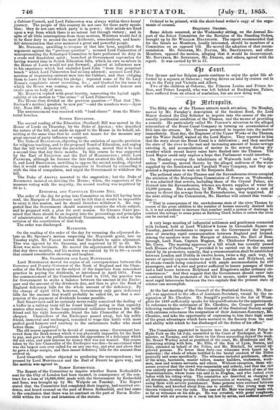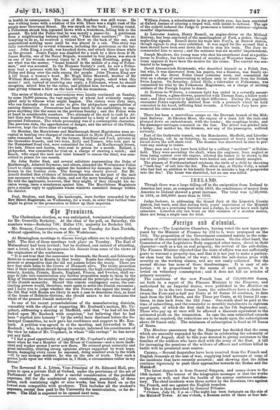311ttropults.
The filthy state of the Thames attracts much attention. On Monday, moved by Mr. Faraday's description of the feculent flood, the Lord Mayor desired the City Solicitor to inquire into the causes of the un- usually pestilential condition of the Thames, and the means of providing a remedy. He particularly called Mr. Pearson's attention to the alleged misconduct of the Brent Canal Company in turning an accumulation of filth into the stream. Mr. Pearson promised to inquire into the matter immediately. Next day, the Engineer of the Upper Works of the Thames, and the Water Bailiff, waited on the Lord Mayor. They reported to him that the story about the Brent Canal is a fabrication ; and they ascribed the state of the river to the vast and increasing amount of house-sewage entering it, and accumulations of matter in the sewers during dry weather which recent heavy rains have flushed into the Thames. The Lord Mayor could only express a hope that Parliament would interfere.
On Monday evening the inhabitants of Walworth held an " indig- nation " meeting, moved thereto by the alleged unfitness of the water supplied by the Southwark and Vauxhall Water Company, and they ap- pointed a deputation to wait on Sir Benjamin Hall.
The polluted state of the Thames and the Ravensbourne rivers occupied the attention of the Metropolitan Commission of Sewers on Wednesday. It was admitted that sewers, including those of the Crystal Palace, are drained into the Ravensbourne, whence are drawn supplies of water for 15,000 persons. But a motion, by Mr. Wade, to appropriate a sum of money to divert the sewage from the Ravensbourne, was negatived. At the next sitting of the Commission, Mr. Hawkes will submit this resolu- tion—
" That in consequence of the unwholesome state of the river Thames by reason of the great addition to the number of houses annually drained into it, it is not expedient to increase that number until a system of drainage to conduct the sewage to some point at Barking Creek before it enters the river can be carried out."
A very large meeting of influential noblemen and gentlemen connected with Ireland, held at Lord Wicklow't house in. Cavendish Square on Tuesday, passed resolutions to impress on the Government the import- ance of securing rapid communication between England and Ireland. Among the speakers were the Marquis of Abercorn, the Earl of Bess- borough, Lord Naas, Captain Magann, Mr. Chichester Fortescue, and Mr. Corry. The meeting approves of a bill which has recently passed both Houses of Parliament, "provided it be carried out in the manner stated by its promoters, namely, that a communication shall be established between London and Dublin in twelve hours, twice a day each way, by means of special express-trains to and from London and Holyhead, and by steam-vessels being constructed with ample accommodation for 400 passengers, and of a size and power sufficient to insure passages of three and a half hours between Holyhead and Kingstown under ordinary cir- cumstances." And they suggest that the Government should enter into a contract with the promoters of the bill to secure, under penalties, the most rapid intercourse between the two capitals that the present state of science can accomplish.
At the last meeting of the Council of the Statistical Society, Mr. Scar- gill was appointed to the office of Assistant-Secretary, vacant by the re- signation of Mr. Cheshire. Mr. Scargill's position in the list of Wran- glers for 1849 sufficiently speaks for his qualifications for the appointment. In reference to the retirement of Mr. Cheshire, the Council passed the following resolution—" That the Council of the Statistical Society accept with extreme reluctance the resignation of their Assistant-Secretary, Mr. Cheshire, and take the opportunity of expressing to him their high sense of the great advantages which have accrued to the Society from the zeal and ability with which he has discharged all the duties of his office."
The Commission appointed to inquire into the conduct of the Police in Hyde Park on the 1st July, assembled in the Court of Exchequer, at West- minster, on Tuesday, and sat there on the three succeeding days of the week. Mr. Stuart Wortley acted as president of the court, Mr. Henderson and Mr. Armstrong sitting with him. Mr. Ellis, of the firm of Lyon, Barnes, and Ellis, attended on behalf of the Police, and Mr. Mitchell, for several ag- grieved persons. No fewer than forty-one witnesses were beard up to yesterday ; the whole of whom testified to the brutal conduct of the Police generally and some specifically. The witnesses included gentlemen, officers of the army, barristers, master tailors, master builders, tradesmen, work- men, men and women servants, and others. Without exception, these wit- nesses averred that the crowd was respectable and orderly, and that the riot was entirely provoked by the Police—especially by the conduct of one of the Superintendents, whose name was said to be Hughes, and who lashed even ladies with his riding-whip. The constables are described as charging in all directions, beating persons without provocation or warning, and threat- ening them with severer punishment. Some persons were enclosed between two bodies, and knocked about from one to another. One young man was thrown violently over the rails. The case of Mr. Moir was amply made out, so far as witnesses on his side go. He was arrested, with groat roughness, confined with six persons in a room ten feet by seven, and suffered severely in health in consequence. The case of Mr. Stephens was still worse. He was walking home with a relation of his wife. There was a slight rush of the people near Grosvenor Street. He was atruck on the back; turning round, a Policeman struck him repeated blows with a truncheon, felling him to the ground. He told the Police that he was merely a passer-by. A gentleman from a neighbouring balcony called out, " Take their numbers!" On at- tempting to do so, be received a violent blow on the back of the ear, and remembered nothing more until he was placed in a cab. This story was fully corroborated by several witnesses, including the gentleman on the bal- cony. John King, a youth, was knocked down, and struck three times while on the ground. James Fasaie was disabled for a week by a blow from D 20. James Martin, one of the Naval Brigade, wounded in four places, was struck on one of his wounds several times by A 349. Adam Houlding, going to see what was the matter, "found himself in the middle of a ring of Police- men," and was arrested. In the Humane Society's yard, he saw a Police- man beat a prisoner with his fist. George Coulshaw was lifted up by the Police and flung over the rails among the people. John Thomas King saw A 147 break a woman's head. Mr. Hugh Bates Maxwell, brother of Sir William Maxwell, seeing the Police driving the people, asked what this meant ? and, instead of receiving any reply, a Policeman, whom he should recognize, seized him by the collar, and pitched him forward, at the same time giving witness a blow on the back with his truncheon.
The aeries of Hyde Park insurrections were faintly continued on Sunday, by some 10,000 persons, the vast majority of whom had evidently congre- gated only to witness what might happen. The rioters were dirty boys, who ran furiously about in order to give the pickpockets opportunities of earning distinction. Precautions had been taken by the authorities to sup- press anything like the scene on the previous Sunday ; and the Police were at hand in considerable numbers. Two attempts of the mob to rush by Al- bert Gate into Wilton Crescent were frustrated by a body of foot and a few mounted Policemen. The whole proceedg was of a contemptible character. The previous riots, the apprehension of danger, and the advice of the Police, however, kept the drive clear of carriages.
On Monday, the Marylebone and Marlborough Street Magistrates were oc- cupied in hearing two charges of riotous conduct in Hyde Park, and deciding cases remanded last week. By the former, Hutchins and Ford, privates in the Grenadier Guards, and two boys, Kelly and Tanner, who took part in the Hampstead Road riot, were committed for trial. At Marlborough Street, two lads, Dixon and Austin, were sent to prison for a month. Ballard, a pickpocket, was committed for trial on a charge of stealing a watch; and Roach, who urged the, mob and tried himself to rescue the thief, was com- mitted to prison for one month.
Sir John Buller East, and several solicitors representing the Duke of Marlborough, Admiral Seymour, and others, attended the Westminster Police Court to claim compensation against the hundred for damages done to their houses in the Sunday riots. The damage was clearly proved. But Mr. Arnold decided that evidence of felonious intention on the part of the mob was necessary to validate the claim, and not the mere breaking of windows. He told the applicants, however, that they might, if they thought his de- cision wrong, issue a mandamus against him. The Marylebone Magistrate gave a similar reply to applicants whose windows sustained damage within his district.
Paul, Strahan, and Bates, the bankrupts, were further remanded by the Bow Street Magistrate, on Wednesday, for a week, in order that further time might be given to the prosecution to follow up their inquiries.



























 Previous page
Previous page